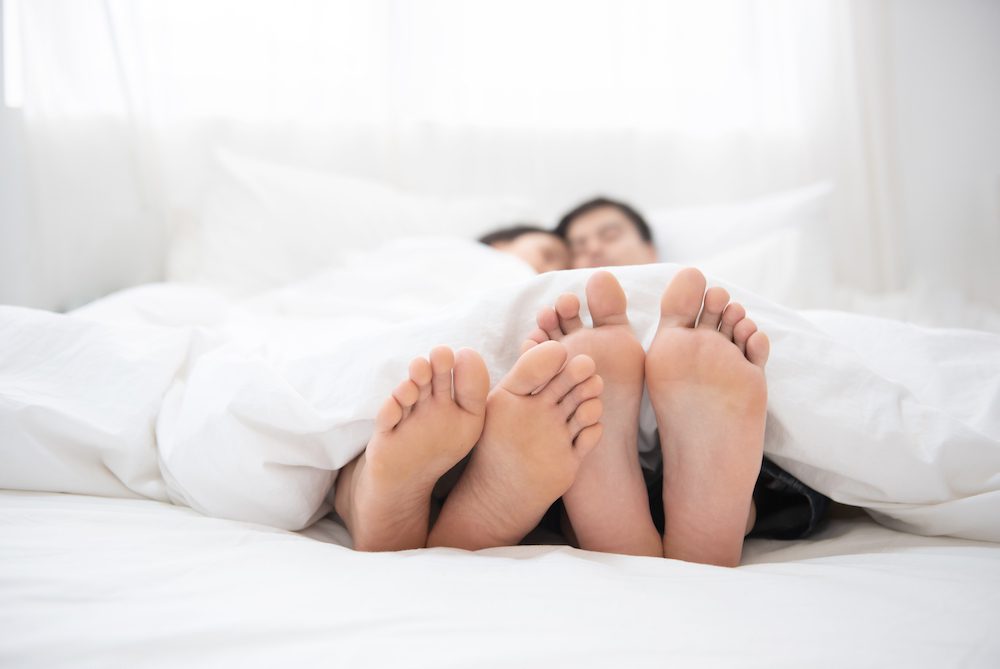Nearly half of adults over the age of 50 experience leg cramps at night. The sudden discomfort can wake a person from sleep or make sleeping difficult. While most leg cramps happen spontaneously with no clear cause, there are also some conditions that may contribute to leg cramping at night.
We discuss the possible causes of leg cramps at night, strategies for how to prevent them, and information on when it may be time to talk to a doctor.
What Causes Leg Cramps at Night?
Leg cramps are caused when the muscles in the calf, thigh, or foot involuntarily contract. Most leg cramps that happen at night have no known cause. These may also be referred to as idiopathic nocturnal leg cramps.
People describe muscle cramps in the leg as a sharp pain or a tight knot that can be brief or last for minutes. Although they can be uncomfortable, nocturnal leg cramps are generally harmless. Leg cramps can develop anytime, though the majority of people who have nighttime leg cramps don’t get them during the day.
While there is often no identifiable cause for a person’s leg cramps at night, some nocturnal leg cramps develop because of health conditions, diet and lifestyle choices, or medications.
Health Conditions
Although leg cramps at night frequently have no known cause, some health conditions may make them more likely or more intense.
- Physiology: The structure of the feet can play a role in whether or not a person has nocturnal leg cramps. For example, people who have flat feet with low arches are more likely to have leg cramps.
- Electrolyte disorders: Conditions that cause a loss of fluid and sodium in the body, such as diarrhea, vomiting, or sweating, may lead to dehydration and leg cramps. Some people with kidney disease may also have cramps after receiving dialysis.
- Pregnancy: Magnesium levels may become low during pregnancy, causing nighttime leg cramps. Work with a doctor if you have leg cramps during pregnancy.
- Blood flow issues: A variety of conditions can cause blood vessels to become compressed or narrowed. As a result, muscles may not get the blood they need, and may feel cramping in your legs.
- Nerve damage: Leg cramps may also occur when the nerves in the body become damaged due to a pinched nerve or injury.
- Metabolic disorders: Metabolic disorders interfere with the body’s ability to make or obtain energy. Hypothyroidism, diabetes, and hypoglycemia are common metabolic disorders that may contribute to nocturnal leg cramps.
- Cardiovascular diseases: Certain heart-related conditions, including angina, high blood pressure, and heart failure, are suspected to cause leg cramps at night.
- Brain disorders: Certain neurological conditions are associated with nocturnal leg cramps. For instance, people with Parkinson’s disease, a disorder of nerve cells in the brain which causes abnormal movements, may experience leg pain at night.
Diet and Lifestyle Choices
The likelihood of developing nighttime leg cramps may also be affected by a person’s dietary habits or lifestyle choices. Examples of some common routines and habits that can lead to leg cramps at night include:
- Smoking
- Dehydration
- Sitting for long periods of time
- Strenuous exercise
- Tight calf muscles
Leg cramps also happen more often among people who weigh more and those that spend a lot of time standing or walking on concrete surfaces.
Medications
Certain medications are believed to trigger leg cramps at night. Research has found that people taking beta blockers, certain diuretics, or birth control pills may be more likely to experience sleep-related leg cramps.
If leg cramps are disrupting your sleep, talk with a doctor and be sure to share a list of medications you are taking.
Leg Cramps vs. Restless Legs Syndrome
Some people may confuse nocturnal leg cramps with restless legs syndrome (RLS) because both conditions produce an unpleasant feeling in the legs during sleep. However, RLS and nocturnal leg cramps are different conditions.
People with RLS feel a strong urge to move their legs. RLS episodes tend to last longer than the sensations caused by nighttime leg cramps and feel more like a crawling or tugging sensation than a sharp pain or contraction.
Another condition that resembles sleep-related leg cramps is periodic limb movements of sleep (PLMS). However, PLMS causes a jerking movement of the leg, as opposed to the pain and tightening common with leg cramps.
It’s important to speak with a doctor if you have discomfort or movements in the legs during sleep. A doctor can talk with you about your symptoms and help determine which condition may be causing your discomfort.
How to Prevent Leg Cramps at Night
Nocturnal leg cramps can be disruptive to sleep, but people can take steps to prevent the nighttime discomfort caused by these episodes.
- Avoid stimulants: Substances such as caffeine and alcohol are known to cause muscle cramps.
- Stay hydrated: Make sure you’re drinking plenty of fluids.
- Keep bed sheets loose: Don’t tuck your sheets in, especially at the end of the bed.
- Wear supportive shoes: Choose daytime footwear that supports your muscles and joints.
- Stretch before bed: Experts suggest that stretching the leg muscles before bedtime can help.
Stretching to Prevent Leg Cramps at Night
The “runner’s stretch” may be an effective stretch for people whose calf muscles tend to cramp up at night. Steps involved in the runner’s stretch include:
- Get in a lunge position with one leg forward and knee bent and the other leg behind with a straight knee.
- Bend the knee of the front leg for 30 seconds until you feel a stretch, keeping both heels planted on the ground.
- Repeat four or five times
- Switch sides and repeat the exercise.
If stretching is difficult for you, riding a stationary bike may be another option. Your doctor can also share information on stretches and exercises that help with leg cramps at night.
How to Treat a Leg Cramp
If you wake up with a distressing cramping sensation in your leg, the best way to relieve the cramp may be to stretch or flex the muscle. Other steps that may help include:
- Shaking the leg
- Getting up and walking around
- Propping the leg up
- Applying hot water to the muscle
- Gently rubbing ice on the leg
When to Talk to a Doctor
If you continue to experience nighttime leg cramps despite stretching your leg muscles and drinking enough water, it may be time to talk to your doctor. In addition, there are a few other signs to look out for.
- Intensity: The leg cramps are severe, last a long time, or happen frequently.
- Accompanying symptoms: You experience redness, swelling, or a warm feeling near the cramp.
- Weakness: The muscle also feels weak or you have difficulty using it.
Your doctor may recommend a medication to reduce the frequency and severity of the attacks. They may offer a vitamin or mineral supplement or prescription medications if needed. If a medical condition is at the root of your muscle cramps, they may recommend treatment for that condition.
References
Ask the Sleep Doctor
Have questions about sleep? Submit them here! We use your questions to help us decide topics for articles, videos, and newsletters. We try to answer as many questions as possible. You can also send us an email. Please note, we cannot provide specific medical advice, and always recommend you contact your doctor for any medical matters.



